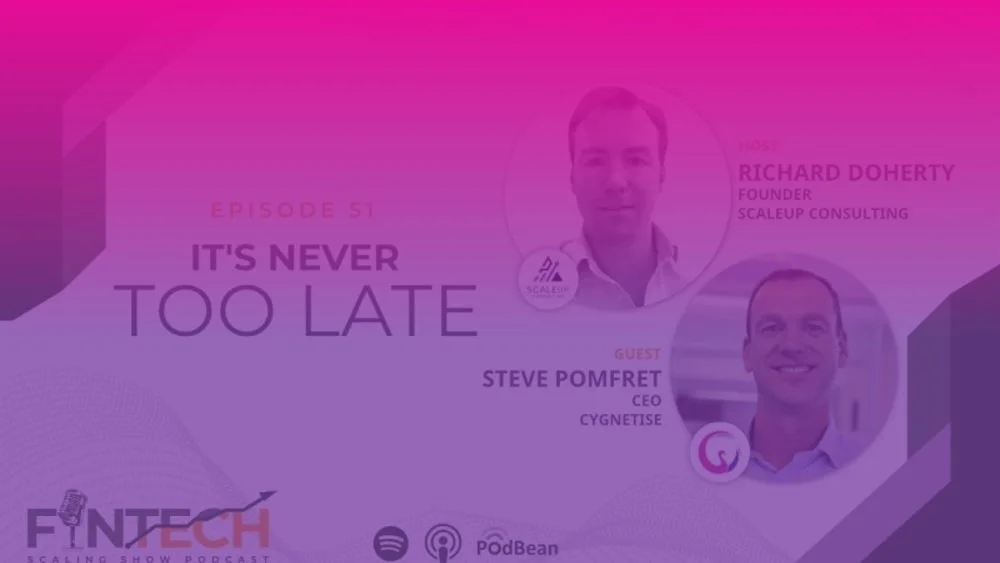The Fintech Scaling Show with Steve Pomfret: Interview summary
Last month, our CEO and co-founder, Steve Pomfret, appeared on the Fintech Scaling Show with Richard Doherty. Here’s a brief summary of Steve’s interview.
Why have you decided to move from corporate banking and consulting into the startup world?
I started off working for banks within operations and as my career progressed, I moved into digital transformation. So, I turned from a more administrative role into a project management role that eventually evolved into being an internal consultant. Essentially, I was immersed in those areas of the business that were deemed to be broken or in dire need of improvement. In most cases, this required implementing some sort of technology or innovation. That’s how, I became very familiar with what we back then called ‘technology within finance’, and what we now call FinTech.
After doing that for 20 years, I left to start up a limited company and become an external consultant. Then, at the end of my first independent project, I thought: “Hey, this is really cool”. But in order to advise my customers [the banks] better, I needed to understand all about those new, innovative technologies in the industry. To do this, I started going to events and networking with people in the sector, and that's when I started seeing more opportunities and decided to jump into the startup space.
How did your business idea come about?
When I started looking at all innovative technologies, one of the things everyone was talking about was blockchain and how it's going to revolutionise trading, clearing and settlement…and how everything in banking will be run on the blockchain.
I, therefore, went on to find out what this blockchain thing was all about. When I did understand it properly and with my knowledge of existing financial technology, I didn't necessarily believe the claims people were making about it – In fact, I thought they were quite outlandish. In some aspects, that gave me the confidence to actually then say: “Well, hang on a second…why don't I actually do something that could be useful. It's an amazing technology, there will be things that will have a decent enough business case to build a solid product.”
Then, I started speaking to peers and experts in the field to get ideas. I then created a matrix of all the ideas and was rating them on a 1 to 10 scale on how good they were depending on a variety of parameters. At that time, a friend of mine, Sean Blake, said, “How about the management and sharing of authorised signatories within banks and corporates?” And I thought that that was a genius thing. It was the idea with the biggest market that's relatively straightforward, and that solves a massive problem within banks and large organisations.
So, what is the problem that you are solving for banks and other big corporates?
So, in every large organisation or bank, the majority of employees will have a responsibility to do things on behalf of their organisation, whether that's making a payment, signing a check, a legal agreement, or an NDA. Each person has certain responsibilities, the levels of which depend on the seniority and their role or function. They're called authorised signatories or delegated authorities.
Each of these organisations will keep registers of who can do what on behalf of the organisation. These registered signers are typically maintained on Word documents or spreadsheets, and they have to be shared with all counterparts the company does business with.
If, for example, bank A is doing business with bank B, and somebody at bank A needs to sign something (e.g. a term sheet), then in order for bank B to be satisfied, they need to know if the person who has signed the document is authorised to do so. So, they will want to see a record of that person on bank A’s formal register. And that register is called an Authorised Signatory List (ASL).
However, because these lists are usually maintained on Word documents or spreadsheets, and they're then emailed as PDF attachments, often nobody is knowing what their latest version is. By the time these registers have been compiled, they're out of date, because somebody might have left the organisation, somebody's been promoted, etc…So, they're really, really dynamic. Hence, to keep all your customers and counterparts up to date, in real time, it is literally impossible to do so using the existing tools and processes. So that's the problem Cygnetise solves.
What is Authorised Signatory Management?
Find out in our latest special report where we discuss the fundamentals of Authorised Signatory Management. Download
Can you share a customer case study to put this into perspective?
If we look at one of our customers, they probably run 10,000 company entities, so they're going to have at least 10,000 authorised signatory lists. Within those lists, different signatories will have different authorities, depending on what area they're in, or what entity they represent, etc.
Because we provide a decentralised database solution (on the blockchain), our customers can open up a specific part of their database on a ‘read only’ basis to whomever they choose, for as long as they choose. They can then update all of their signatories’ data really efficiently, in real time. Thus, anyone with permission to view their records will have constant access to the latest version of their data, and won’t need to be notified every time a change to the information has been made. Thus, there's no need for emailing, posting and printing, and users get a live view of what's going on in a risk-free and sustainable way.
How did you approach the branding aspect of the business? What was your go-to-market strategy?
Everything is still a work in progress. I don’t like saying this, but the COVID-19 pandemic has helped us getting more traction. With people in different locations, the existing process of managing authorised signatories has become even harder to handle. On top of this, the world is now looking at how companies can become more ESG-friendly. So, we’ve started seeing a major shift in focus towards governance, and authorised signatories, respectively. We also complement the use of e-signatures and other tools that enable remote working and aiding governance. So, that's the kind of message that we focus on from a branding perspective.
For us, the referral network has also been particularly powerful. Pre-COVID, everyone was scared of making a decision, then it moved into everybody being interested. And now people have started to finally make decisions and take action.
Last but not least, we are also extremely lucky to have a brilliant board of very experienced investors, experts and entrepreneurs in the FinTech space who help us scale the business even further.


